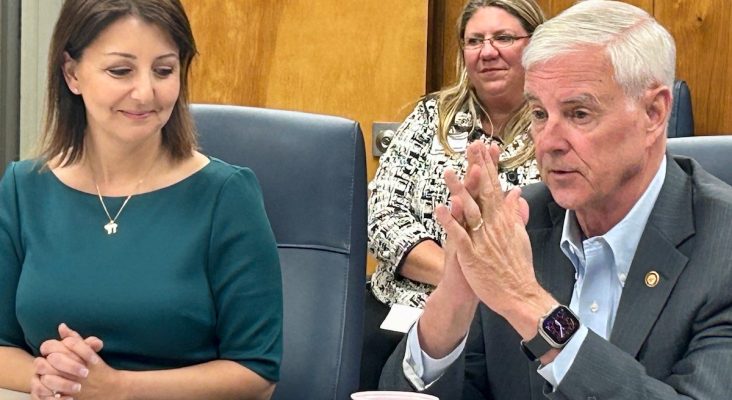CDC director visits Northwest Arkansas, meets with local health leaders
by April 8, 2024 6:59 pm 735 views

Dr. Mandy Cohen, director of the U.S. Centers for Disease Control and Prevention, and U.S. Rep. Steve Womack, R-Rogers, were in Northwest Arkansas on Monday (April 8) to visit with regional health care officials.
Dr. Mandy Cohen, director of the U.S. Centers for Disease Control and Prevention, on Monday (April 8) spoke with Northwest Arkansas health advocates about partnerships and funding the region receives in efforts to improve public health programs and outcomes.
Cohen was the guest of U.S. Rep. Steve Womack, R-Rogers, who invited her to Northwest Arkansas to see the agency funds at work. She began the day in Bentonville observing early childhood education at Head Start and later the school district’s Ignite program that equips high school students to enter professional careers upon graduation. She stopped at Walmart’s home office in Bentonville to visit with the retail giant about its healthcare initiatives and watched the eclipse from their parking lot.
Community Clinic CEO Judd Semingson and Pearl McElfish, vice chancellor of the University of Arkansas for Medical Sciences (UAMS) Northwest campus in Fayetteville, convened a group of community leaders to speak with Cohen and Womack about their respective roles in improving the overall health of all people in Northwest Arkansas. McElfish said UAMS received CDC grants, one of which was $5 million. The funds were used to train 230 healthcare workers who were sent out into the community, and 76 different partners in Arkansas. The work included educating non-English speaking populations about the importance of COVID-19 vaccines and primary health care.
She said other funds are being used to address ongoing mental health needs and birth-mother mortality, which is the highest in the nation in Arkansas. Some of the work in lowering the mortality rate of birth mothers includes more training and education for community health care providers.
Womack told the room full of healthcare advocates they are vital to the ongoing improvement of positive health outcomes. He applauded Cohen’s efforts to remove politics from the CDC and focus on improving the health of Americans.
“This is one organization under the federal umbrella that we cannot do without or underfund,” Womack said during the meeting.
HISPANIC, MARSHALLESE SUPPORT
Cohen said 80% of CDC funding goes to state and local programs to improve health. In the post-pandemic world, she said education continues about the importance of vaccines for vulnerable populations. Univision Arkansas was one of the partners involved in educating non-English-speaking residents about mobile clinics, vaccinations and other programs UAMS offers.
“Our people are often afraid of doctors, and that was a big problem during the pandemic. Our organization was glad to partner with UAMS to get the health information in the right language for them,” said Zuzuki Monarez, a journalist with Univision, who also grew up in Northwest Arkansas.
The Marshallese community was represented at the meeting by several people, including Benetick Kabua Maddison, executive director of the Marshallese Education Institute in Springdale. The Marshallese community had a higher mortality rate during the COVID pandemic than the rest of the general population, according to health professionals at the meeting.
Maddison said partnerships created during the pandemic to help educate and reach Marshallese people were a good start. Semingson said many Marshallese and other non-English-speaking households were reached during the pandemic and began to build trust. He said that has generated relationships with primary care doctors who speak their languages to follow their health and work to reduce the ethnic groups’ higher diabetes rates.
Cohen said the siloed world that existed before the pandemic for public health workers, traditional health systems and the government made a step forward because COVID required everyone to work together. She said partnerships like the ones forged in Northwest Arkansas to address diabetes, mental health, and birth-mother mortality are the future.
“We can’t go back to silos of 2019 and before,” Cohen said. “It’s a team sport, and it takes everyone.”
AVIAN FLU
When asked about the latest avian influenza case of H1N5 infecting mammals, Cohen said the agency is studying the latest transmission in the dairy cow and the Texas man who worked with the sick animal.
She said avian flu is nothing new and has been around for decades. She said transmission to a mammal like a dairy cow and human is new and bears more study. Thankfully, mammal infections have had mild symptoms, and there are vaccines available.
“We are looking to see if the virus is mutating in any way. Right now, it does not appear to be,” she said.
